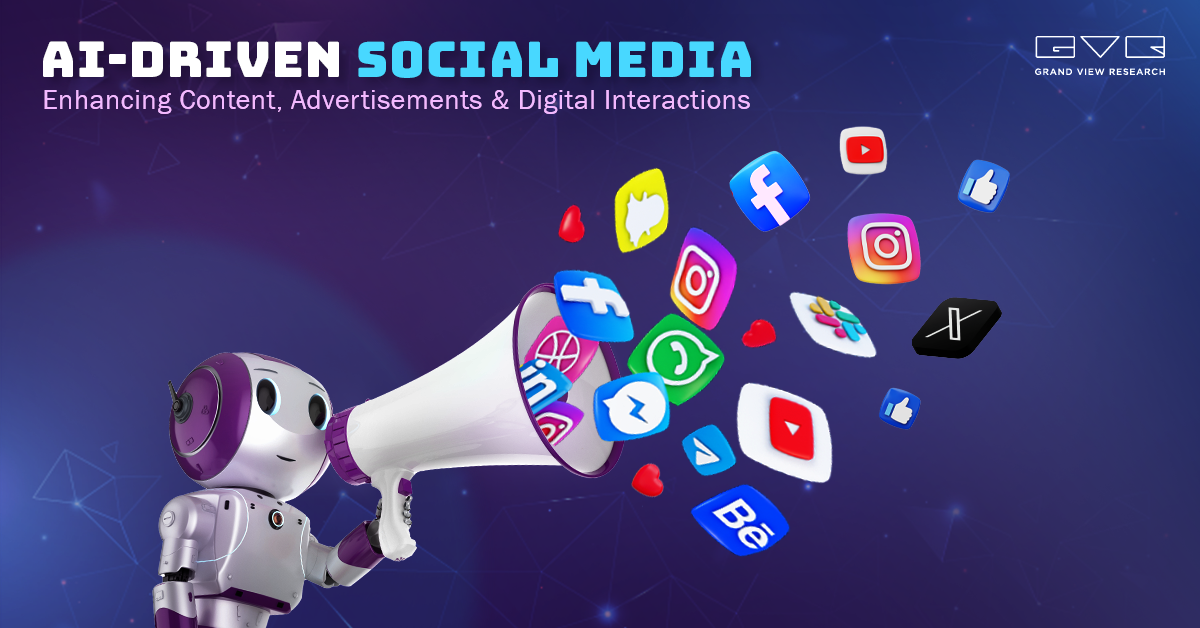AI-DRIVEN SOCIAL MEDIA: ENHANCING CONTENT, ADVERTISEMENTS AND DIGITAL INTERACTIONS
Social media is one of the many industries that Artificial Intelligence (AI) has transformed. The way we communicate, consume content, and connect with brands has changed as a result of AI’s integration into social media platforms. This shift is visible across a number of domains, including customer support, ad targeting, and content personalization and moderation. AI-powered chatbots offer immediate customer service, and sentiment analysis tools give companies priceless access to client feedback. AI will have a greater influence on social media as it develops, adding more advanced features and creatively enhancing user experiences.

CONTENT PERSONALIZATION
Content personalization is one of AI’s most obvious effects on social media. AI algorithms are used by platforms such as Facebook, Instagram, and TikTok to evaluate user behavior, preferences, and interactions. These algorithms monitor the content that people enjoy, post, discuss and spend time on. AI selects tailored content feeds that are most likely to interest certain consumers based on the data. For example, if a user often views videos about cooking, the algorithm will give that material in their feed. The platform gains ad income, user retention, as well as improved user experience and prolonged user engagement.
FILTERING
Ensuring a secure and courteous atmosphere is essential for social media networks. By identifying and removing objectionable content, including spam, hate speech, and false information, artificial intelligence plays a critical role in content moderation. The huge amount of content that is created every second makes traditional manual moderation unscalable. On the other hand, AI-powered technologies are able to quickly detect and eliminate dangerous content by analyzing enormous volumes of real-time data. For example, Facebook employs AI to proactively identify and eliminate postings that break community standards even before people report them. In addition to improving user experience, this automated moderation aids platforms in adhering to moral and legal guidelines.
CHATBOTS
AI-driven chatbots, which offer 24/7 customer support and assistance, are becoming a typical sight on social networking sites. These chatbots can handle a broad variety of queries, from providing commonly asked question-answers to helping with order tracking and problem-solving. AI chatbots are a reasonably priced way for companies to raise customer satisfaction and engagement levels. Businesses use AI chatbots to communicate with customers on platforms like Facebook, and WhatsApp, providing prompt responses and tailored exchanges. This not only speeds up response times but also frees up human workers to deal with more complicated requests.
ADS
Social media companies rely heavily on advertising for revenue, and AI has greatly improved their ability to target ads., AI systems examine enormous volumes of consumer data, including interests, habits, and demographics, to provide highly tailored advertisements. With more accuracy, advertisers can more successfully contact their target demographic, which raises the possibility of conversions. For example, a user is more likely to encounter ads for exercise equipment or health supplements if they often interact with fitness-related content. Advertisers benefit from a higher return on investment and users see more relevant adverts when using this method.
CONTENT CREATION
Artificial intelligence is transforming the methods used for generating and selecting content. Tools like machine learning and natural language processing enable the creation of content that resonates with your intended audience. For instance, AI can be employed to produce articles, films, engaging advertising content, and social media posts. Moreover, AI platforms for content curation can sift through vast datasets to provide viewers with the most pertinent and captivating content, streamlining the process for content creators.
Navigating Social Media Procurement
The influx of AI across industries and applications has prompted industry leaders, including Chief Procurement Officers (CPOs), to emphasize social media procurement solutions. The rising footfall of social media tools has made it invaluable to assess cost and pricing, supplier and sourcing strategies. For instance, the use of third-party and in-house tools may influence the expenses attributed to social media management. Some dynamics that can impact on cost are number of profiles being managed, community size, features used and volume of inbound messages and mentions.
CONCLUSION
Unquestionably, the introduction of AI in social media has changed the game by improving customer service, relevance of content, and personalization of interactions. AI technology will continue to advance and impact social media in new and creative ways as it does so. Understanding and utilizing AI’s social media skills is crucial for businesses, marketers, and consumers to stay ahead in this fast-paced digital world. Social media companies can continue to improve user experience and stimulate engagement in a world where connections are becoming more and more interwoven by embracing AI.
To schedule a free market intelligence database demo, please complete the form below:
Service Guarantee
-
Insured Buying
This report has a service guarantee. We stand by our report quality.
-
Confidentiality
Your transaction & personal information is safe and secure.
-
Custom research service
Design an exclusive study to serve your research needs.
-
24/5 Research support
Get your queries resolved from an industry expert.